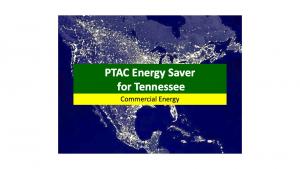- 24 reads

Our GREENandSAVE Team is pleased to share information like this about sustainability solution providers. If you would like to submit information on your company, please contact us.
TIME TO ACT:
Save 20% or more on HVAC. It’s important now more than ever for a sustainable future!
Optimizing PTAC units with a “smart” device is a fast, easy, and cost-effective way to achieve Commercial HVAC Energy Savings. A Packaged Terminal Air Conditioner is a type of self-contained heating and air conditioning system commonly found in: Hotels, Motels, Senior Housing Facilities, Hospitals, Condominiums, Apartment Buildings, and Add-on Rooms & Sunrooms.
Business owners and homeowners face increasing challenges with energy costs to save energy and money in Tennessee. PTAC Energy Saver offers an Adaptive Climate Controller (ACC). It is a proven HVAC energy saving device that quickly installs on PTAC units. There are many companies that claim to produce energy savings, but the ACC device is multi-panted and proven over many years. Plus, it has extensive validation tests by organizations such as:
- ConEdison, Manhattan Plaza New York City
- Environmental Test Laboratory, Ohio
- EME Consulting Engineers (Third Party), Sponsored by NYSERDA, New York
- State University of New York, Oneonta, NY
- Tim Garrison (Third Party Testing)
- McQuay Cooling Tests
- Purdue University Tests (Phoenix)
- ConEdison Tests by ERS
Typically, when an HVAC system turns off, shortly after, the blower fan motor turns off. The ACC reprograms the blower fan not to shut off but to throttle back the rpm airflow to an exceptionally low speed, quiescent level airflow or “idle speed”. This allows for a gentle but continuous air movement into the building that helps keep equilibrium of climate conditions in the occupied space and saved energy.
PTAC Energy Saver can help you navigate the complexity of HVAC energy saving choices: CONTACT PTAC Energy Saver
Here is an example of some Commercial HVAC Energy Saving info for Tennessee:
Tennessee Valley Authority Offers Incentive For UV-C Disinfection In Commercial HVAC Systems
The Tennessee Valley Authority (TVA), a U.S. corporate agency that provides electricity for seven southeastern states, has announced incentives for ultraviolet germicidal irradiation (UVGI) in commercial HVAC systems, the first type of rebates any energy company in the U.S. has given for UV.
The incentive is $30 per ton of cooling capacity for in-duct mounted UGVI systems and is focused on UV-C-band (100‒290 nm) emission to kill coronavirus and other pathogens in the airstream. It targets commercial applications including hospitals, schools, reception areas, retail establishments, nursing homes, churches, hairdressers, business offices, and industrial facilities.
“While hospitals have an immediate need to combat the spread of COVID-19, businesses across the Valley can look to adopting technologies such as UVGI as they find new ways of doing business,” TVA states on its website. “If you are looking to keep your personnel healthier and promote a safer environment for your customers, UVGI can quickly help your businesses by minimizing the spread of COVID-19. You might say UVGI is like a germ-killing super-ninja that trained for years to kill COVID-19 and every other virus and bacteria that it comes in contact with.”
COVID Leads To Cost Cuts
On average, an incentive of $30 per ton knocks the price of UV-C equipment and installation down by about a third, said Dan Jones, president, UV Resources.
“The irony of it is that for the last 20 years, UV has been sold for energy efficiency,” said Jones. “ASHRAE had done research here in the U.S. and down in Singapore that actually proved there was energy savings by adding UV downstream to the coil. You would have thought that would be what would make an energy company jump onboard, but this is for adding UV for air purification, versus trying to get rebates for energy efficiency.”
COVID-19 has become infamous for speeding up trends that would have otherwise been another decade in the making, and Jones believes more energy companies will follow TVA’s lead.
“We've been talking to energy companies for years now, trying to get them to do these rebates, and the challenge for them had been quantifying the energy savings,” Jones said. Now that the focus has shifted to infectious disease — energy savings isn’t even mentioned once on TVA’s UVGI information page —Jones predicts that the conversation around UV-C is “going to blow up.”

